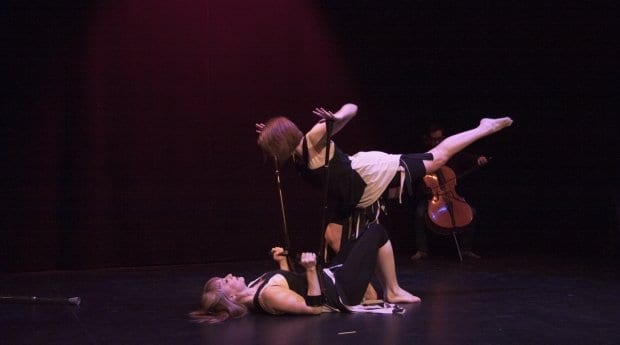A man is giving an unusual dance performance — unusual in that he doesn’t stand to dance; he’s in a wheelchair. Eventually, surprisingly, he gets out of his chair, dismantles it and is left with scattered bits of metal and two wheels. It’s as if he’s saying, “Here I am. I am who I am with or without my wheelchair.”
The integrated contemporary dance company Propeller Dance stages performances where disabled people are a big part of the action. “There’s not a lot of representation of difference on the stage,” says co-artistic director Renata Soutter. “We want to create a safe space for people of all abilities to perform.”
Propeller Dance will hit the stage with a boatload of difference with Flesh and Spokes, the company’s contribution to the arts festival Ontario Scene. Presented by the Great Canadian Theatre Company, Flesh and Spokes consists of three inspiring pieces.
The first, also called “Flesh and Spokes” — which features the aforementioned chair deconstruction — carries the message that disabled people aren’t broken creatures who should want to be fixed; disabled or not, everyone faces limitations of some kind, and those should be understood and embraced.
It’s set to original music composed by Jesse Stewart and performed by him live on stage. “He creates all the music on a wheelchair,” Soutter says. “It’s kind of amazing. He takes a wheelchair and brings drumsticks and a violin bow and plays the chair.”
The second piece, choreographed by Shara Weaver, is a remount of a 2012 performance called “Deliverables.” It’s a less abstract, more theatrical piece about the comical power dynamics in a dysfunctional workplace.
Propeller Dance, in addition to being a professional company with regular performances, has educational programs for children, youth and adults. The third piece is a performance by students from the two adult classes.
Soutter says Flesh and Spokes is meant to challenge our preconceptions about disabled people in more ways than one. “It’s about diversity, but we try to create something beautiful too. And we do, or so people tell us. Often representations of disability aren’t beautiful.”
Flesh and Spokes
Friday, May 8 and Saturday, May 9, 7:30pm
Great Canadian Theatre Company, 1233 Wellington St W, Ottawa
ontarioscene.ca


 Why you can trust Xtra
Why you can trust Xtra


